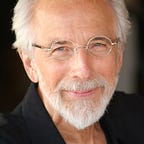How to Fit the Pieces Together
Giving Balance to Our Existence, Poetry to Our Hearts and Strength to Our Character
When we’re children, adults ask us to decide what we want to be when we grow up. When we’re college students, we are asked to decide on a major. And then, there we are, living the adult life, grappling with day-to-day problems, too often avoiding those life-orienting questions and decisions, just allowing the future to unfold in the way that it does.
For any number of reasons, we may avoid making plans for our lives. Distraction may rule. Or we may worry that a plan puts an end to joy and spontaneity. Or that a plan is tantamount to joining the Rat Race and missing out on a meaningful life.
Or it could be that we think it is just too pressure-filled, too difficult a task, to sit down and figure out our objectives, our goals, our mission — if you will — and then to put into play a life of our own design. We may think it is smarter to just go with the flow, to just keep up with the trends. However, what public opinion considers to be trendy — the flow — often means just to carry on a “seat-of-the-pants” or a “what’s meant to be will be” approach to life.
We also tend to arrive at adulthood lacking the tools to be in command of the way in which we wish to live out our lives, i.e. a life of our own design. Maybe it’s because we didn’t listen when the valuable information was delivered. After all, we’re smart and insightful and we know lots of stuff. And, thanks to the oversized American ego that we’re all introduced to and inevitably accommodate, we can’t help but believe we’re masterminds. We just knew how our lives should and would turn out!
However, at this point, we may recognize how much of the life we are living just happened to us. One thing happened. Then another. Then another. And now that’s the life we have — its mood and intelligibility often at the effect of the unintended consequences of important choices we didn’t make.
But, then of course, no one gets it all right all of the time. Much of life is an experiment. No rulebook takes the guesswork out of our moment-to-moment, day-to-day encounter with life. We are in the world, a manifestation of possibility, a subject of the world as we find it, on its terms.
Yet by default and of course not entirely, we are also the author and authority of our lives. We imagine, conjecture and experiment with possibilities. Our success rate at these various experiments depends on two factors. The first is the way in which we conceive, administer and monitor the experiments with the authenticity of truth and discipline. The second is the way in which, with honesty and integrity, we match our thoughts and conduct to what we discover.
Sometimes we try to be detached, an objective observer. At other times, we’re at a loss, enervated, at wit’s end. How do we develop our autonomous perspective and the character of our thinking while wresting command of the force of our nature? What if our hard-wired and passion-filled emotional nature (the living system that we are) is at odds with the need to engage the trials and tribulations of civilized living (the regulated environment in which we find ourselves)? Or if what needs doing in a crowded, complex world is not an easy fit for our one-of-a-kind living system?
On the other hand, as I said, we’re smart. With a good deal of thoughtful examination and the exercise of independence, we can:
- Learn how to account for our subjective experience.
- Master the cognitive ability to see ourselves, to think for ourselves and be in command of our purpose.
- Become proficient at responsibly referencing, monitoring and creating our lives.
- Explore and build the character that underpins authenticity, nerve and the integrity of our responsibility.
- Educate the senses and sensibilities that give our experience shape and resource and our contribution to others meaning and efficacy.
These practices are at the heart of command. They are our means to grabbing hold of a living system rocked by immediacy and the inevitable anger, discontent and disappointment that accompany a lack of absolute control. In short, these resources give balance to our existence, poetry to our hearts and strength to our character. In accordance with America’s idea of individual freedom within a regulated environment, we find ourselves a good fit.
I’ve been teaching classes on autonomy and life for over 30 years. These classes offer a unique and powerful governing philosophy for practical living. They stand firmly on America’s promise of freedom, justice and equality and the opportunity to create a life of our own design. More information is available on my website: autonomyandlife.com.
